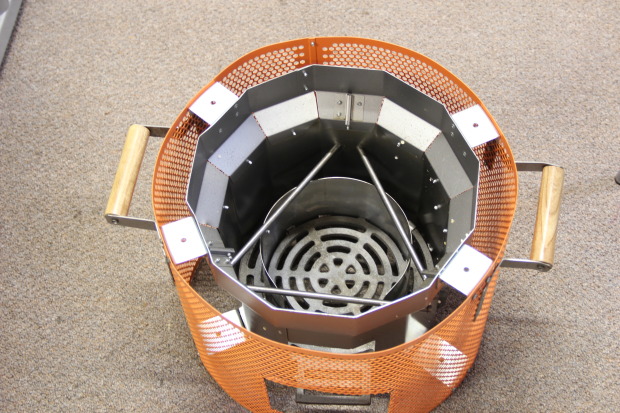| 01-15-2015, 04:38 PM |
Alsanosi Adam
 Alsanosi Adam Alsanosi Adam
Registered: 01-14-2015
Total Posts: 3
|
|
 New stoves help improve quality of life in Darfur New stoves help improve quality of life in Darfur
|
By: Alsanosi Adam

Q: Have you been to Darfur?
A: Nope.
Q: Do you know how it feels to work there?
A: Nope.
Omnia Abbas smiled as she remembered the first two questions of a job interview two years ago that changed her life. Now she is the field representative for a nonprofit that is working to reduce air pollution and improve peopleвҖҷs lives in the rural areas of Darfur by producing a better cooking stove.
In her Oakland office, the young Sudanese woman is surrounded by household items used in the rural areas of northern Darfur. Hanging on the wall is a traditional Sudanese handmade bag, a gofa, normally used to temporary store the aseeda, the Sudanese local bread, and other food items. A steel pot, known as tambal bai, often used for cooking the aseeda, is stationed on top of a new special stove.
AbbasвҖҷs journey started at a job interview in Khartoum, Sudan, and led her to the Oakland-based company Potential Energy, which makes and distributes those special stoves. Her job has also taken her since then through the Abo Shook and AL Salam IDP camps вҖ“ that is the international shorthand for the temporary homes of вҖңinternally displaced personsвҖқ вҖ“ in northern Darfur, Sudan.
вҖңI have no Idea what I was going for when I applied to this job,вҖқ Abbas said. The job is maintaining the connection between Potential Energy and the local partners organization in Sudan that works closely with the people on the ground.
Women in Darfur, Abbas said, traditionally do their cooking on a вҖңladayah,вҖқ a stove that sits upon three rocks heated by a wood fire below. But these ladayahs can cause health problems and air pollution. According to the World Heath Organization, 4 million people every year die вҖңprematurelyвҖқ from illnesses connected to household air pollution from cooking with solid fuels. http://www.who.int/mediacentre/factsheets/fs292/en/http://www.who.int/mediacentre/factsheets/fs292/en/
The traditional firewood cooking stove caused additional hardship in Darfur, where firewood has grown scarce over the last 20 years. Due to deforestation, war, and climate change, firewood became very expensive. Women in northern Darfur IDP camps have been known to walk for miles to get the firewood вҖ“ facing the risk of being kidnaped, raped or murdered.
In an effort to address both problems, Potential Energy, in cooperation with Berkeley Labs and Engineers Without Borders, has invented a new energy-efficient stove call the Berkeley Darfur Stove (BDS) вҖ“ a stove that uses less firewood, and produces less harmful smoke.
The stove is cylindrical, about the size of a recycling bin, and weighs 11 pounds. It has a curved windshield made of steel. There is a wood pit, вҖңa fire room,вҖқ in the bottom; the fire room is separated from the pot by pieces of steel in the shape of a triangle.
These stoves were invented at the Berkeley lab and are manufactured in India; assembled in Alfashir, Sudan; and then distributed in the IDP camps in northern Darfur.
There are 15 different models of the Berkeley Darfur stove. The most advanced of the companyвҖҷs models, which have incorporated suggestions from the Sudanese users, have two wooden handles that allow users to move them safely around even while the stoves are lit. These newest versions use half the wood of the previous versions.
The stove has a five-year life span. Women in Darfur have nicknamed it вҖңKanon Khamsa Dagaie,вҖқ Arabic for вҖңfive-minutes stove.вҖқ вҖңIt cooks really fast,вҖқ Abbas said.
Since 2007, the Berkeley Darfur Stove project has distributed 28,686 free stoves in northern Darfur. In 2011, they started selling the stoves in northern Darfur for 60 SDG, the Sudanese equivalent of about $18, and managed to sell 11,990 stoves. But now there is competition from a private company in Sudan, which started manufacturing a new kind of stove called the AZ Stove. The Hjar Group also distributes the stoves in the same areas that the Darfur Stove project is distributing.
Abbas added that they are working on new stoves, which will be sold for the equivalent of about $36. The price covers the cost of assembly and distribution for their local partners in Sudan.
With a grant from the Global Alliance for Clean Cook Stoves, a funding initiative вҖ” in the form of a revolving-loan program started in northern Darfur вҖ” allows women to purchase the stoves and pay the loans back in three installments.
Potential Energy has two projects underway in Africa, one in Ethiopia and the other in Sudan. But other African regions also suffer from the same cook stove pollution that causes respiratory diseases, and Abbas said the company is planning to expand to other Sub-Saharan African countries.
Beyond the obvious pain and struggle in Darfur, there is accomplishment, Abbas said. She enjoys her job. вҖңItвҖҷs nice to see people in the IDP camps move in units just like the villages that they came from,вҖқ she said. People have started settling, building houses, buying phones, and socializing, she said. And now these new stoves are helping women in Darfur save time, and their lives.
вҖңHistory tells us that people move on and forget,вҖқ Abbas said. вҖңBut Sudan has seen too much suffering. I never doubt that there is a better future for us in Sudan. I am a part of our present, and when that better future happens, I will be part of it.вҖқ
|
|
    
|

|

|

|
|
|